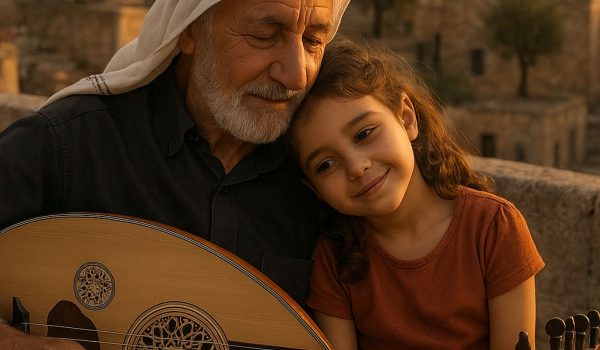Some memories can’t be written down. They live in a melody, a lullaby, or the rhythm of a drum. In Palestinian culture, music has long carried the weight of memory—memories of land, stories of loss, and songs of return. Whether shared in a family living room, sung at a protest, or recorded in a studio, music keeps personal and collective history alive.
For many Palestinians, especially those living in the diaspora, music is more than sound. It’s a thread connecting generations. Grandparents hum songs from their childhood, parents sing about resilience, and youth remix these traditions into something new. Through this exchange, memory finds a voice that words alone can’t carry.
What This Article Will Explore About Music and Memory
This piece looks at how Palestinians use music to carry stories across time:
- How music preserves family history and lived experiences
- The role of traditional songs and instruments in cultural identity
- How musicians blend old and new to keep memory alive
- Why passing songs from one generation to another matters
- The power of melody in maintaining belonging, even in exile
These songs are not just creative expressions. They are living archives of emotion, survival, and hope.
Music as a Family Archive
In many homes, music begins with memory. A grandmother may sing a folk tune she learned as a child in a village that no longer exists. A father may tap a simple rhythm that once marked wedding celebrations or village gatherings. These small acts pass more than melody—they pass the feeling of place and presence.
Children learn these songs without knowing every word. Over time, meaning grows. A phrase once repeated by habit becomes a link to stories told over tea or during long car rides. The music becomes a kind of family album—one you don’t have to open, just listen to.
Even those who no longer speak Arabic fluently may know the words to certain songs by heart. This is how memory sticks. Music invites participation. It invites emotion. That makes it one of the strongest tools for passing down identity.
Folk Traditions and Cultural Identity
Palestinian music draws on rich folk traditions. Songs like “Zareef al-Toul” and “Mawtini” carry stories of love, struggle, and belonging. The oud, a deep-toned string instrument, often sets the tone. So do the rhythms of the tabla and the melodies of the qanun.
These elements form a soundscape that is instantly recognizable to Palestinians across the world. They echo in refugee camps, at community events, and in new homes where people try to stay rooted even after being displaced.
These traditional songs often follow call-and-response patterns, which make them easy to share. Whether sung at weddings or political rallies, they invite people to take part. And in that participation, people remember. They remember not just the past, but who they are.
Modern Artists, Old Messages
Today’s Palestinian musicians are finding new ways to pass on old memories. Hip-hop, jazz, electronic beats, and spoken word are merging with folk influences to create a sound that’s both grounded and global.
Artists like DAM, Nai Barghouti, and Le Trio Joubran bring different sounds to the table. But many of their songs draw from shared themes—exile, resistance, longing, and pride. By mixing traditional lyrics or instruments with contemporary styles, these musicians carry memory into new spaces.
They perform on international stages, post on streaming platforms, and collaborate across borders. Their work reaches youth who may have never visited Palestine but feel connected through music. This is how memory travels. It adapts, but it doesn’t vanish.
Singing Through Struggle
Music is also part of protest and resistance. From marches in the West Bank to solidarity events in cities around the world, songs help people stay united. They lift spirits during dark times and give rhythm to the demand for justice.
During moments of violence or displacement, when words are hard to find, music often says what people feel. A chorus sung by a crowd can express sorrow, defiance, or hope all at once.
Even the act of singing a banned or censored song becomes an act of memory and defiance. In that moment, the music becomes more than sound—it becomes testimony.
Passing It Forward
The act of passing songs from one generation to another is quiet but powerful. A child learning a lullaby from a parent doesn’t just gain a tune—they inherit a piece of history. They inherit values, emotions, and a sense of place.
Workshops, music programs, and cultural centers across Palestinian communities support this process. They teach youth about instruments, traditional songs, and recording techniques. These spaces allow old stories to be shared in new voices.
In some families, recording elders singing or speaking about their musical memories has become a way to hold onto personal history. These recordings become treasures—pieces of a narrative that might otherwise be lost.
More Than Just a Song
When a Palestinian sings a song passed down from an ancestor, they’re doing more than performing. They’re remembering. They’re reclaiming. They’re connecting with a place they may never have seen but still carry inside them.
Music lets people feel part of something bigger than themselves. It’s a quiet kind of resistance, but one that resonates deeply. It tells future generations, “You belong. Your story matters. Your memory lives here.”
Whether it’s played on an oud, blasted from a speaker, or hummed before sleep, music keeps memory alive. It turns history into something you can feel, carry, and share.

